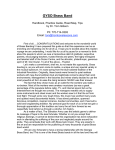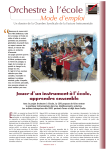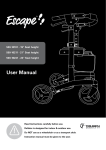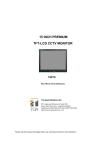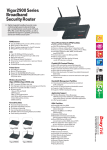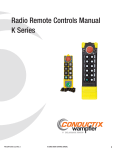Download Yamaha ST-7 Owner`s manual
Transcript
日本語 English Deutsch 取扱説明書 Owner’s Manual Bedienungsanleitung Mode d’emploi Manual de instrucciones Español Français Pickup Mute Yamaha Silent Brass Pickup Mute Thank you for purchasing the Yamaha Silent Brass Pickup Mute. In order to obtain the maximum performance and enjoyment from your Pickup Mute, we urge you to read this Owner’s Manual thoroughly before using. Please keep this Owner’s Manual in a safe place for later reference. Contents of Set ● Pickup Mute PM9/PM7/PM6/PM5/PM3/PM2/PM1 ● Cable ● Owner’s Manual * Personal Studio ST7 is not included. * With the exception of the owner’s manual, each attachment can be ordered separately. 11 ■ Pickup Mute Specifications Pickup Mute Instrument Dimensions (diameter x length) Maximum hand rest Weight width PM9 Piccolo Trumpet 70 x 145 mm (2-3/4" x 5-11/16") — 80g (2.8oz.) PM7 Trumpet, Cornet 70 x 200 mm (2-3/4" x 7-7/8") — 120g (4.2oz.) PM6 Flugelhorn, Alto Trombone PM5 Trombone, Bass Trombone PM3 French horn PM2 Euphonium PM1 Tuba 108 x 270 mm (4-1/4" x 10-5/8") — — 150mm 300g (10.5oz.) 190 x 410 mm (7-1/2" x 16-1/8") 220mm 800g (1lbs.,12oz.) 380 x 980 mm (14-15/16" x 38-9/16") 420mm 2900g (6Ibs.,6oz.) ● Common specifications for all models: Internal Microphone: Electric condenser microphone, Nominal Level: -25dB to -35dB, Material: ABS resin * Specifications and design are subject to change without notice. 12 270g (9.5oz.) Your Pickup Mute will give you years of reliable service if you follow the simple rules given below: ■ Location Do not expose it to the following conditions to avoid deformation, discoloration, or more serious damage. • Direct sunlight (e.g. near a window). • High temperatures (e.g. near a heat source, out side, or in a car during the daytime). • Excessive humidity. • Excessive dust. • Strong vibration. ■ Handling and Transport • Never apply excessive force to the controls, connectors or other parts. • Always unplug cables by gripping the plug firmly, not by pulling on the cable. • Disconnect all cables before moving the unit. • Physical shocks caused by dropping, bumping, or placing heavy objects on the unit can result in scratches and more serious damage. ■ Cleaning • Clean the cabinet and panel with a dry soft cloth. • A slightly damp cloth may be used to remove stubborn grime and dirt. • Never use cleaners such as alcohol or thinner. YAMAHA is not responsible for damage caused by improper handling or operation. SPECIAL MESSAGE SECTION SPECIFICATIONS SUBJECT TO CHANGE: The information contained in this manual is believed to be correct at the time of printing. However, Yamaha reserves the right to change or modify any of the specifications without notice or obligation to update existing units. Do not attempt to service this product beyond that described in the user-maintenance instructions. All other servicing should be referred to qualified service personnel. This product, either alone or in combination with an amplifier and headphones or speaker/s, may be capable of producing sound levels that could cause permanent hearing loss. DO NOT operate for long periods of time at a high volume level or at a level that is uncomfortable. If you experience any hearing loss or ringing in the ears, you should consult an audiologist. IMPORTANT: The louder the sound, the shorter the time period before damage occurs. NOTICE: Service charges incurred due to a lack of knowledge relating to how a function or effect works (when the unit is operating as designed) are not covered by the manufacturer’s warranty, and are therefore the owner’s responsibility. Please study this manual carefully and consult your dealer before requesting service. Disposal Notice: Should this product become damaged beyond repair, or for some reason its useful life is considered to be at an end, please observe all local, state, and federal regulations that relate to the disposal of products that contain lead, batteries, plastics, etc. If your dealer is unable to assist you, please contact Yamaha directly. 92-BP 13 Set up and Use ■ Personal Studio ST7 Connecting Cable PICKUP MUTE 1 2 PHONES 1 2 Stereo Earphone PM7 for TRUMPET PM6 for FLUGELHORN Lock Nut PM5 for TROMBONE Hand Rest (P. 17) PM3 for FRENCH HORN PM2 for EUPHONIUM Handle 14 Before connecting the cable and attaching the mute, make sure the power is switched OFF and the earphones are removed from your ears. PICKUP MUTE 1 2 PHONES 1 2 Stereo Earphone Head Connecting Cable ■ Assembling the PM1 Handle Lock Nut Body 1. Lay the Head on the floor. Inner Head hook 2. PM1 for TUBA Place the Body on the Head and fasten with the three hooks. 3. Fully extend the Inner Head that is located in the center of the Head. * Refer to pg.16 for instructions on attaching the mute to the instrument. 15 QUICK GUIDE Attaching and removing the pickup mute ■ Attach the Pickup Mute to the Tuba As shown in the illustration, hold the instrument with your left hand and, while turning the pickup mute, firmly insert it into the bell with your right hand. 1. For Euphoniums, with the bell facing up, hold the PM2 by its handle in your right hand and firmly insert it into the bell. 4. 16 2. After assembling the Pickup Mute (refer to pg. 15) lay it on its side. While seated, hold the tuba between your legs. Hold the Pickup Mute by its handle and lift it up. Attach the mute fixing hooks to the bell. If necessary, adjust the length (tension) of the hook belt. Holding the Pickup Mute with both hands, gently insert the Inner Head into the bell of the tuba. (Continue holding the tuba between your legs.) 3. Adjust the Pickup Mute so that it is positioned in the center of the bell. * Noise will result if the Inner Head is touching the bell. After removing the mute from the instrument, lay the mute on its side. If the mute is stood vertically, the Inner Head will collapse causing a burst of noise in the earphone that may result in hearing impairments. 5. Connect the lock nut equipped end of the supplied cable to the Pickup Mute’s output jack and secure the lock nut. When putting the mute away, hold the Inner Head with both hands and gently collapse it back into the Body. Strongly dropping the Inner Head may result in damage to the Mute. Holding the mute when playing the horn standing up The following cautions are for your own safety and to avoid possible damage to and malfunctioning of the equipment, and thus should be observed carefully. ● Firmly insert the PICKUP MUTE into the bell of the instrument. ● Avoid dropping the PICKUP MUTE. Dropping the mute may result in damage. Also, shock to the ear from the noise produced by dropping the mute may result in damage to your hearing. ● Do not touch or jab the PICKUP MUTE’s microphone component. Microphone As shown in the illustration, lightly support the hand rest in the middle of the mute with the ball of your thumb while holding the instrument at the bell rim with your other fingers. The hand rest also features a ring for a wrist band, allowing you to hang the mute from your wrist (just like any other mute) while emptying the horn. (Wrist band is not included.) * Always remove the mute before emptying the instrument. ● Avoid stepping on the cable. ● When you are finished playing, remove the PICKUP MUTE from the instrument. Clean any moisture on the PICKUP MUTE with a cloth. DO NOT WASH WITH WATER. 17 QUICK GUIDE Insert firmly Signal path REHEARSAL ROOM CONCERT HALL CHURCH REVERB MODE From PHONES 1 Tighten the Lock Nut AUX IN REVERB LEVEL Connect the supplied cable to the PICKUP MUTE output jack and tighten the LOCK NUT. PLAYER 2 MASTER VOLUME PLAYER 1 To PICKUP MUTE 1 Don’t step on the cable * Personal Studio ST7 and stereo earphone are not included. 18 Disconnecting the cable while the power is ON may result in damage to the unit. The sudden noise may also may result in hearing impairments. Do not disturb your neighbours during late hours.









